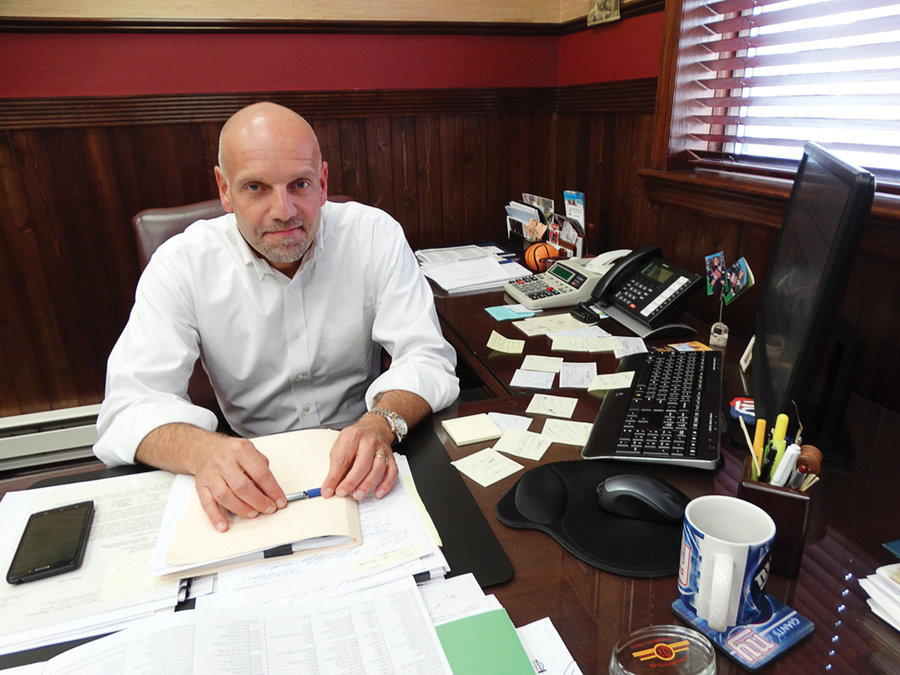Based on a state requirement for an annual inventory of best practices in North Bergen conducted by the Department of Local Government Services, the municipality scored a 43 out of 50, placing it in the top category of 41 or above.
Municipalities that score a 40 or below are penalized and lose a portion of their state aid. North Bergen will retain all its state aid.
Township Administrator Chris Pianese presented an overview of the findings at the Board of Commissioners meeting on Oct. 21. Among the items on the agenda at that meeting was a new resolution establishing a policy for how the township authorizes emergency purchases. The resolution was requested by the state as a new best practice this year.
Each year the list of questions on the best practice inventory changes slightly, with new or altered questions. North Bergen has participated for five years, consistently scoring in the low 40s.
“What we’re trying to do is find pocket lots that we can rent on a monthly basis to residents. We’re actively looking for additional space.” –Chris Pianese
____________
Another of the new requirements on the best practices inventory is for the governing body to be provided with periodic updates on different authorities within the town. Pianese spoke at the meeting about two of them, providing 2014 year-end results for the North Bergen Municipal Utilities Authority (NBMUA) and the Parking Authority.
$1M surplus at MUA
The Municipal Utilities Authority has a $21 million budget, consisting of two revenue streams. The first is fees generated by users, accounting for about $15 million annually.
“Second is the entire solid waste side of the MUA, which is household garbage pickup,” explained Pianese in a discussion with the North Bergen Reporter this week. That $6 million is funded by the municipality.
“The big driving factor in solid waste is dumping fees,” said Pianese. “Seventy percent of the budget is dumping fees.” After several years of significant increases to dumping fees, they leveled off the last four or five years to a 1-2 percent increase annually.
That in part allowed for the NBMUA to generate a surplus of over $1 million this year.
The largest factor in the surplus came from the annual connection fees, which were larger than anticipated. When a new development comes to town, whether commercial or residential, it is required to pay a one-time, upfront connection fee to the MUA. The fee is calculated according to a formula that factors in projected water usage.
“When you have a 150- or 200-unit building going in, the connection fee can be $700,000,” said Pianese.
Health benefit costs for NBMUA employees remained stable this year, also contributing to the positive financial results. The NBMUA is part of a shared services agreement with other township functions, allowing for leveraged health benefit costs.
“Three factors resulted in the good year-end for them financially,” summarized Pianese. In addition to the higher than expected connection fees and the flat health plan costs, the township received “partial forgiveness of a NJ Environmental Infrastructure Trust (NJEIT) loan.”
North Bergen received the state loan through the New Jersey Department of Environmental Protection (NJDEP) for upgrades to the Woodcliff Wastewater Treatment Facility located on River Road across from Palisades Medical Center. Woodcliff provides water treatment for about one-third of North Bergen, along with Guttenberg.
“We did major physical improvements to the facility in 2014 to the tune of $3 to 4 million,” said Pianese, with money coming from the state loan. “A portion of the loan was forgiven as a result of the project being ranked highly” by the state, he explained.
Further improvements to the facility are needed, with plans underway for another upgrade in 2016-17 to handle current and projected usage. Costs in the $10-15 million range are anticipated.
Parking Authority adds 24/7 visitor passes
The Parking Authority budget increased from about $1.8 million annually to over $2 million, partially as a result of taking over sweeper enforcement. “They now write the ticket as the sweeper goes down the street,” Pianese told the commissioners on Oct. 21. That resulted in increased expenses, but also provided an additional source of revenue as the Parking Authority keeps a portion of the ticket revenue generated.
Staffing has changed from 16 full time employees to 18, with the number of part time employees decreased, in order to minimize turnover. Payroll was not impacted significantly.
Among the major projects completed last year was the addition of a new parking lot on 21st Street and Kennedy Boulevard, near the downtown library. A portion of the lot is dedicated to rental parking for residents.
“There’s a strong demand for parking in town,” said Pianese, “so what we’re trying to do is find pocket lots that we can rent on a monthly basis to residents. We’re actively looking for additional space.”
Cameras will also be installed in municipal parking lots in 2016, with links to the police CCTV command center.
A study is underway to investigate the possibility of angled parking in the business district, specifically along one side of Broadway and Bergenline Avenue, to increase the number of spots available.
Also forthcoming are three machines to dispense visitor parking stickers 24/7 so people don’t have to visit the Parking Authority during business hours to purchase one. The cost will be slightly higher in the machines, which will be located at the Parking Authority and the two libraries.
Resident passes will not be available from the machines, only temporary visitor passes.
Art Schwartz may be reached at arts@hudsonreporter.com.
